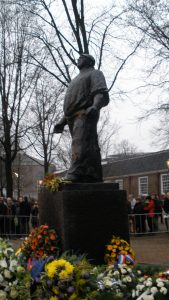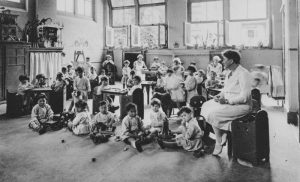The February 1941 Strike brought 300,000 Amsterdammers into the street to protest the first roundup of Jewish people, the only such strike in Western Europe. Every February 25, thousands still gather and lay flowers at the foot of the Dockworker, the statue who symbolizes this mass action. The strikers participated despite the presence of German soldiers and police throughout the city. For the Jewish people, it was a significant moment of affirmation by their fellow citizens.

The Strike challenges progressive Americans. When the word spread that 425 Jewish men had been rounded up and shipped off, the Strike was organized almost overnight. What would it take to bring us into the streets in comparable numbers (almost 40% of the city in that case)? Children in cages? Turning away prospective refugees as the U.S. did in the 1930s when Jews were fleeing Hitler? Slashing food stamps to the bone? The slaughter of school children with assault weapons?
And yet, how much would a strike like Amsterdam’s really accomplish? Although it was a courageous gesture and lifted spirits for a few days, the February Strike sputtered out. The Germans were astonished that the other Dutch would stand up for their Jewish neighbors, so the ensuing crackdown was delayed – but vicious. Only a tiny sliver of people actually resisted from that time forward. Most hunkered down, shook their heads, complied, and tried to survive.
In reflecting on what such people “should” have done, it’s all too easy to make snap judgements and condemn those who were barely surviving on many levels. When the Nazi Occupation began, the Germans carefully started small in attacking the Jewish people and others whom they hated. Initially, the invaders simply turned the other way when local anti-Semites started beating Jewish people up and breaking windows. That set the tone for what was to follow, an air of permissiveness. Slowly but surely, the Nazi propaganda worked. Attacks intensified, depicting Jewish people as barely human, with ugly language to match.

Following the Strike, the other Dutch people were being conditioned not to look, not to notice, much as we are today. The reporting on family separation of refugee families, for example, is a rarity, so that the anguish of children placed with unknown foster families or in institutions is erased. The threats to Vermont’s migrant dairy workers are escalating, but only the workers themselves and close allies hear about it regularly. New prisons are called “detention centers” and are buried in rural areas where legal help is almost non-existent. Our country, 97% immigrants and refugees, is closing the door to asylum seekers. How quickly what is patently wrong becomes normalized.
The miracle in the 1940s is that a few Dutch people didn’t buy the Nazi propaganda. Their minds kept working after the Strike, and they resisted wherever they were, however they could. They transcribed illegal BBC broadcasts, they produced and distributed underground newspapers, they hid their Jewish neighbors or strangers, they forged identity cards and more, they cleaned hideaways for airmen, they smuggled Jewish children to the countryside and much more. They risked their lives and their peace of mind, and that of their families. Historians say about 25,000 people resisted, and it could be many more, but it still is far less than 1% of the population.

Most Dutch people believed “It can’t happen here,” and tried to get on with normal life as much as possible. They believed the Germans wouldn’t dare go too far in their anti-Jewish program. The Netherlands had been the safest place in Europe for religious minorities since the Inquisition. Both Dutch Jews and Gentiles believed Hitler wouldn’t dare do in Amsterdam what he did in Berlin. Tragically, 75% of the Jewish people in the Netherlands were rounded up and murdered, 80% in Amsterdam. The Germans made rules about keeping the blinds closed during roundups. Toward the end, they came to the neighborhood of a resister and shot people at random, whether or not they were involved in any way. The poisonous atmosphere daunted people and twisted their thinking. Even when their neighbors were taken away under their noses, they did nothing. Some were the same people who roared into action for the February Strike.
What is happening to us, and what are we going to do about it?
